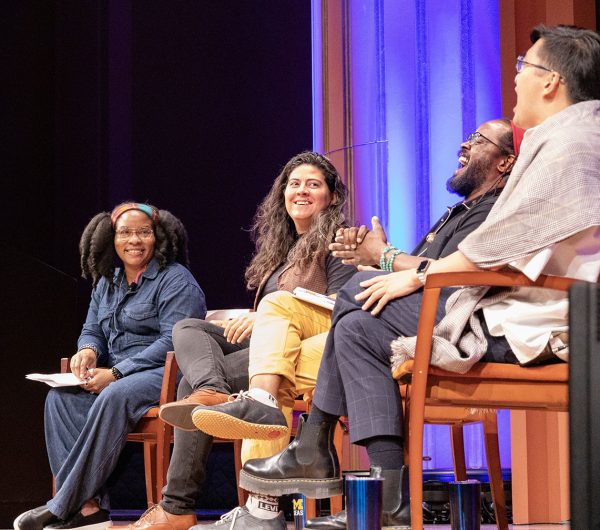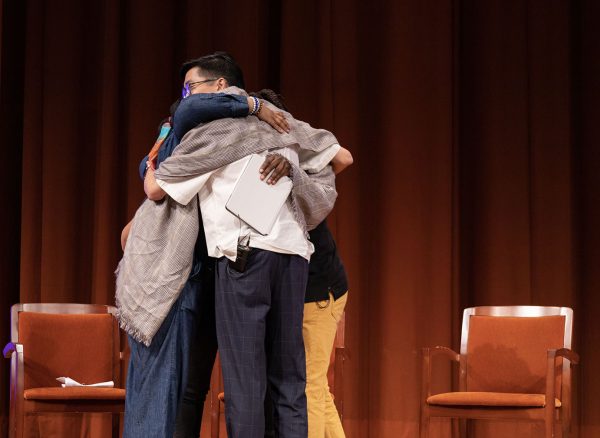
The panel of environmentalists discusses social issues. Paula Farmer | Washtenaw Voice
by Grace Crandall
Staff Writer
The University of Michigan held a panel called “Justice in Focus,” on April 13 as part of this year’s Earth Day celebrations. Hosted by the U-M Tishman Center for Social Justice and Environment at the School for Environment and Sustainability, the panel was moderated by Nayyirah Shariff, co-founder of the Flint Democracy Defense League.
The panel featured three environmental leaders, each of whom has worked at the center of various environmental advocacy movements. The event was held in the Rackham Graduate School Auditorium, with about 50 people in attendance.
The discussion focused on the social and environmental changes since the pandemic, especially changes regarding social justice movements. Shariff began the conversation by reflecting on how the death of George Floyd created greater social networks, and asked the panelists what they learned about collective power.
“Covid was a great elucidator,” said Anthony Rogers-Wright, director of environmental justice for the New York Lawyers for Public Interest. “It showed us all the systems not working. Movements cannot be ephemeral.”
“This was a time of contradiction,” agreed issac sevier (they do not capitalize the initial letters of their name), the founder and co-director of People’s Utility Commons in California. “Cash assistance lifted the poverty level. But it was short-lived.”
Maria Lopez-Nunez, deputy director of advocacy and organizing for Ironbound Community Corporation, spoke about her work in helping pass New Jersey’s Environmental Justice Cumulative Impacts Bill, which blocks new industrial facilities from entering overburdened communities such as Newark. New Jersey has defined “overburdened” as any area in which at least half of households qualify as low-income.
Lopez-Nunez has worked with the people of Newark, defending their rights for environmental and housing justice. She emphasized the importance of community organization to the audience.
“EJ (Environmental Justice) law took a while, but the fact that there is justice is because of us,” said Lopez-Nunez, leaning forward in her chair. “If we lose, (we) try to lose forward.”
The panel also discussed the Justice40 Initiative, a climate policy that began in New York in 2019, then was issued as an executive order by President Biden in 2020. Justice40 seeks to direct 40% of benefits from certain federal investments to disadvantaged communities, Rogers-Wright explained. These investments include clean energy, energy efficiency, and sustainable housing.
Some states such as California have tried to pass a state law to see what 40% looks like realistically. Now the concern is using the allocated money correctly. Each panel member pointed out the importance of keeping government officials accountable.
“Our government is just people,” said sevier, who works towards ending utility shutoffs and creating new utility frameworks. “Our history has been to eliminate people who understand racial justice. We need to rebuild and restore (society) with a progressive fervor.”
The discussion ended with Shariff asking the panelists what Justice40 could look like on a local level, and how to bring social justice into the community. Each panelist reminded the audience that struggling is part of the process of finding a solution.
“Embrace the idea that thresholds are okay, and that trying to go against thresholds is going against nature,” said Rogers-Wright. “Don’t be afraid to fail.”
“Look alive. Pay attention,” added Lopez-Nunez. “Stop making Earth Day something separate from democracy. It is democracy and public struggle of those that care that will help us. Whoever we become ancestors to will remember what we did now.”
The entire discussion can be viewed on YouTube via the U-M School for Environmental and Sustainability channel.

The panelists embraced after their discussion. Paula Farmer | Washtenaw Voice


